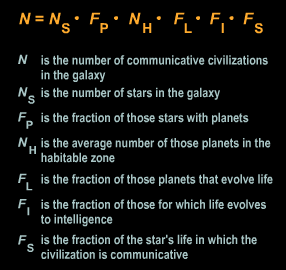Exoplanets as a subject is covered in the
exoplanets section.
Exoplanets in terms of
astrobiology does have implication on another
project:
SETI. While I personally believe in the SETI
project, it is easy to see that this subject does
garner some hostile feeling. My wife used to work in
the same building as SETI's home office, and bomb
threats were a common occurrence.
While there is
no dedicated SETI section on this site, the
Additional Resources provides, well,
Additional Resources.
Detection of
exoplanets has benefited SETI such
that targeted searches can be performed. In order to
help narrow the target list, space-based
interferometers like the
IRSI (InfraRed Space Interferometer - Project
Darwin) and the
TPF (Terrestrial Planet Finder) are in the
design stages. The sensitivity of these instruments
is expected to detect smaller planets as well as
attempt a
spectroscopic analysis of a planets
atmosphere (if present). The specific
spectroscopic
signature of interest is (click for larger image):

Image Credit
The three main ingredients of a life-sustaining
atmosphere are:
- Water - H2O
- Ozone - O3
- Carbon Dioxide - CO2
Detection of this type of atmosphere is currently
the Holy Grail of astronomy. Predicted launch dates
for the TPF is 2014 and 2015 for the IRSI.
One of the things to consider when looking for
Earth-like planets is determining the habitable
zones.

(Image credit: Brooks/Cole Thomson Learning)
Depending on the type of star, the location of a
planet is important because of concerns over heat.
The
temperature of the zone should be "just right,"
but that's a relative term. The image above serves
as an example to what habitable zones may reside
about different types of
stars.
There are a lot of
stars out there so the chances
of an
Earth-like planet existing around some other
star are quite high, but how high exactly?

(Image credit: Brooks/Cole Thomson Learning)
Frances Drake, the astronomer who
founded the SETI project, put together the Drake
Equation to serve as a guide. This is not a real
mathematical equation, but instead gets us to think
that the possibilities of extra-terrestrial life is
greater than we realize.
Back to Top |

